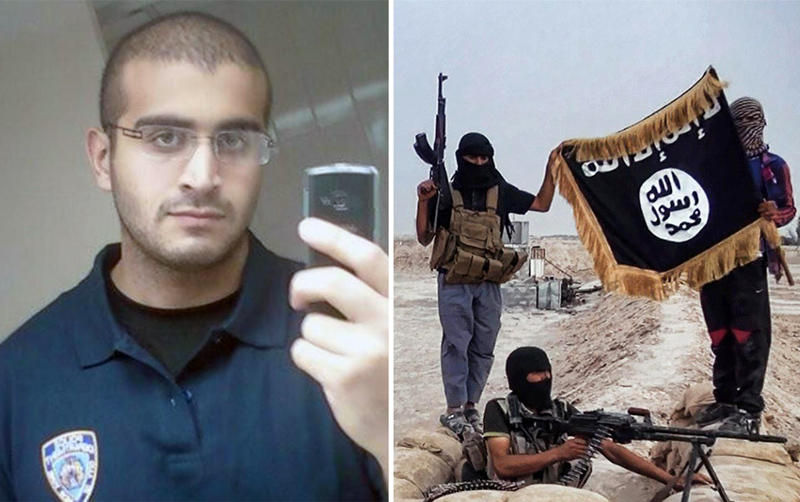Radicalization and the Grain of Sand
by Alexander H. Joffe/The Daily Caller/June 28, 2016
The story of Orlando shooter Omar Mateen, like those of countless other “homegrown” terrorists, is now familiar to the point of cliché. The parents immigrate to the West filled with hope, but their children fail to thrive. They may be successful in some things and fit in with others of their generation, but only superficially.
Sometimes they are soccer-playing, rap-aspiring, beer-drinking lads from the neighborhood, whose failures often lead first to car theft and drug dealing. Other times they are outwardly successful, but the contradictions between the terms of that success and an inner reality or aspiration become too much to bear.
Within them is a grain of sand that irritates, which forces them to seek out that which they believe is missing in themselves. It is a means of overcoming individualism, the self, and becoming part of something much larger. It is a path to meaning.
Passions begin to burn over causes, indignities, injustices; the world does not work the way is it supposed to. Visions of perfection begin to loom but the means of realization require commitment to secrecy, lies, and double lives, to violence and inflicting pain. A sense of authenticity and being whole grows until, in a flash, rage explodes outward.
The stories of most ‘homegrown’ Muslim terrorists are all too familiar.
The base instincts of their insecurities, misogyny, homophobia, and anti-Semitism are given useful scriptural context and legitimation by local mosque sermons. The videos they view online extol jihad with heroic visions of Muslim warriors past and present.
Sometimes outward behavior changes in ways obvious to co-workers, such as the adoption of Islamic dress, strange statements about Islamic supremacism, and complaints about Western “decadence.” They become indignant when questioned or mocked by friends about their increasing religiosity.
In a search for authenticity, they make all-important visits to Saudi Arabia or the homelands of their parents, places they left as children or knew not at all, in search of answers about themselves, anxious to understand their place. But they find they belong nowhere, except in the world that ISIS claims to be remaking. And they return home with a fire in them, having either enlisted in a larger plot or with their own smoldering inside. Then the countdown begins.
There is nothing quite like this in the non-Muslim world. There have been plenty of self-radicalized Christians and Jews in the past few centuries, but few turned to terrorism and fewer still became terrorists in the name of religion. Iconic examples of violent Jewish radicals include anarchists Emma Goldman and Alexander Berkman, who attempted to murder industrialist Henry Frick, Communists like Leon Trotsky, and later members of the Weather Underground in America.
Differing interpretations of divine will.
But neither the identities nor the causes of these revolutionaries were remotely Jewish. They embraced what they thought to be the inevitable course of history and aspired to awaken the masses to a higher state of being. Jews who became radicalized overwhelming acted in the name of humanity, only rarely for the Jewish people, and almost never for the Jewish God.
The one notable exception to the universalist goals of Jewish revolutionaries is Zionism. But its goals have been more precisely ethnic and national, not religious. Apart from a few marginal groups (e.g. Gush Emunim, an underground cell that sought to blow up the Dome of the Rock decades ago) and “lone wolves” like Yaacov Teitel, Baruch Goldstein, and Yigal Amir, God’s will has had little to do with Jewish radicalism.
While Jewish radicals mostly leave Judaism to join universal movements, radical Islamists embrace their religious faith and almost exclusively pursue Muslim goals, both locally (Palestine, Kashmir, Chechnya, etc.) and globally. No thought is given to bettering humanity, except in the sense of subjugating it to Allah. Jewish and Christian religious authorities, with only marginal exceptions, find political violence anathema. Judaism is not very rich source of legitimation for modern violence. Its history of conquest and domination is exclusively local and literary. It lacks Islam’s traditions of earthly rewards for conquest and resulting heavenly rewards for heroic martyrdom, and there is no history of individual or mass violence to terrorize conquered populations into submission (even biblical accounts of the conquest of Canaan are sharply debated as to their morality). There is a long messianic tradition, but nothing that seeks to bring the end times through violence that ignites cataclysm.
Jewish (and Christian) religious authorities, with only marginal exceptions, find such violence anathema. Fleetingly few Jewish children are socialized to hate in ways that would spark, much less legitimize, indiscriminate violence, nor are they taught to dream of glorious days past that could again become real through such triumphs of the will.
For Jews and Christians, God’s plan for this world is opaque, and the shape of the next is vague. For others, and for Muslims in particular, these plans are imprinted deep into their culture, tiny grains that when compressed too far, ignite into fireballs. Such differences are key to understanding the making of Omar Mateens.























